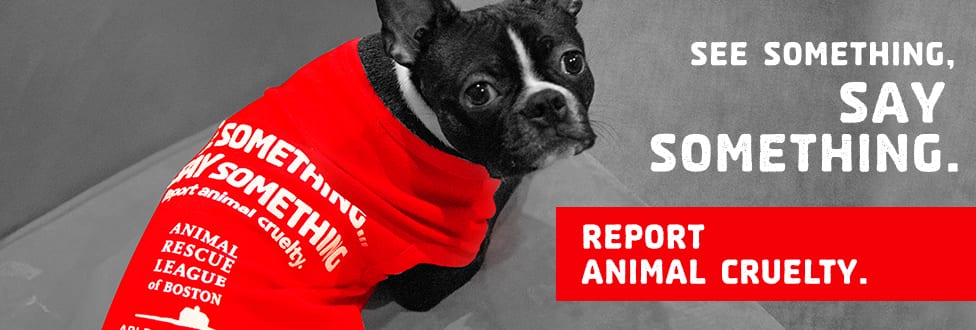April is Prevention of Cruelty to Animals Awareness Month
Animal cruelty comes in many forms, including physical abuse, neglect of basic care, abandonment, dog fighting, and animal hoarding. Because many studies have demonstrated a strong link between cruelty to animals and other forms of domestic and community violence, prevention plays a critical role in improving the safety and welfare of both animals and people in Massachusetts.
Know your state’s animal cruelty laws
In 2014, the ARL’s Center for Animal Protection assisted in over 300 animal law enforcement cases. Unfortunately, this is a small number when you consider the startling statistic that 4 out of 5 animal cruelty cases go unreported.
We all have a role to play in prevention. Be aware and get to know the animals in your neighborhood. If you suspect animal cruelty, call your local authorities right away. Help raise awareness and educate others about this issue.
Learn the 7 most common warning signs of animal cruelty and take action!
While most of us recognize that punching, kicking, burning, choking, or hitting an animal with an object are acts of animal cruelty, there are also several more subtle warning signs of animal cruelty to watch for that could indicate mistreatment, neglect, or abuse:
- Howling or barking for a sustained period of time or hearing an animal cry in pain with higher pitched, more persistent vocal sounds than usual.
- Singed, matted, chronically or excessively dirty hair or fur.
- Wounds, unusual scars, hair loss, frequent limping often on different legs, or signs of improper nutrition such as weight loss or prominent visible ribs.
- Animals kept caged or tied with little room to move for long periods of time or without regular interaction with people
- Lack of protection from the weather or fece- or debris-strewn living areas for animals.
- Collars, leashes, or halters so tight they visibly dig into the animal’s face or neck.
- A large number of animals coming or going from a property.
If you know of or suspect animal cruelty, report concerns to your local authorities. Click here to learn more about how you can prevent animal cruelty.

